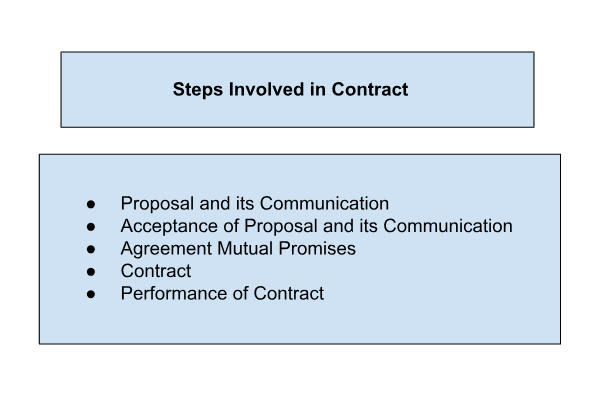Table of Contents
Contracts are a common concern in every organisation. Companies indulge themselves in several transactions with the intention of creating legal relationships. All such agreements leading to legal relations are termed contracts. In this article, we will discuss in detail the Indian Contract Act 1872, the meaning of contract, agreement, steps in the formulation of a contract and its essential of being a valid contract.
Indian Contract Act 1872 Overview
The law of Contract in India is governed via the Indian Contract Act 1872 and it is mainly based on English common law consisting of judicial precedents. The Act provides that the rights and obligations arising out of the contract are observed and the promises are kept. It grants appropriate legal remedies to the aggrieved party in case of breach of the contract.
Objective of Indian Contract Act 1872
The objective of the Contract Act is to ensure that the rights and obligations arising out of a contract are honoured and that legal remedies are made available to an aggrieved party against the party failing to honour his part of the agreement. The Indian Contract Act makes it obligatory that this is done and compels the defaulters to honour their commitments.
Extent and Commencement of Indian Contract Act
It extends to the whole of India except the State of Jammu and Kashmir. It came into force on the first day of September 1872.
What is a Contract?
An agreement enforceable by law is a contract. All agreements are contracts if they are made by the free consent of parties competent to contract, for a lawful consideration and with a lawful object, and are not hereby expressly declared to be void.
Definition of a Contract
A contract is a legally binding agreement that means there must be some kind of agreement between two parties. However, not all agreements are contracts because not all agreements are legally enforceable. Legally enforceable means that a court will say that an agreement is a contract.
Agreement + Enforceability = Contract
Some Important Terms Related to the Indian Contract Act 1872
Here are some important terms related to the Indian Contract Act 1872.
- Proposal – When one person signifies to another his willingness to do or to abstain from doing anything, with a view to obtaining the assent of that other to such act or abstinence, he is said to make a proposal.
- Promise – When the person to whom the proposal is made signifies his assent thereto, the proposal is said to be accepted. A proposal, when accepted, becomes a promise. The person making the proposal is called the “promiser and the person accepting the proposal is called the It promise”:
- Consideration – When, at the desire of the promisor, the promisee or any other person has cloned or abstained from doing, or does or abstains from doing, or promises to do or to abstain from doing, something, such Act or abstinence or promise is called a consideration for the promise.
- Agreement – Every promise and every set of promises, forming the consideration for each other, is an agreement. An agreement not enforceable by law is said to be void.
Steps Involved in the Contract
Contacts can be made by following a well-defined process involving different steps. These steps are listed below

Essential Elements of a Valid Contract (Sec. 10)
Below are the essentials of a a valid contract mentioned in detail. Read the following table for better undertanding of the nuances of a valid contract.
| Essential Elements of a Valid Contract | |
| Essential | Detail |
| Offer and Acceptance | The first essential for creating a contract is an offer. The person making the proposal is called an offeror or promisor and the person accepting the offer is called the offeree or promisee. |
| Intention to create legal obligation | Agreements made by the parties without an intention to create a legal obligation are not enforceable by law. |
| Lawful Consideration | Under section 10 consideration is said to be one of the essentials of a valid contract and it is reiterated in Section 25 of the Act that without consideration the agreement becomes void. |
| Lawful Object | A contract must be made with a lawful object, which means it must not be forbidden by law; or defeat the provisions of any law, or is fraudulent, or involves or implies injury to the person or property of another is immoral or opposed to public policy. A contract made with an unlawful object is void. |
| Free consent | According to Section 13: two or more persons are said to consent when they agree upon the same thing in the same sense. It should be free from Coercion, Undue Influence, fraud, misrepresentation and mistake. |
| Two or more competent parties | A contract can be entered between two or more parties only, no one can make a contract with himself. Thus, at least two parties are required to enter into a contract. |
| Terms of the agreement must be certain | The terms and conditions present in an agreement must be clear and unambiguous. According to Section 29 of the Act lays down that the contracts made with uncertain terms are void. |
| Agreements must be capable of performance | According to Section 56 of the Contract Act, any agreement made to do an impossible or unlawful act is itself a void agreement. |
| Not Expressly declared to be void | According to Section 2 (g), all those agreements which are not enforceable by law are void. |
| Other legal formalities | A contract can be in written form or can be entered orally. In certain cases, it is given under the Act that the contract must be in writing, registered or there must be witnesses, etc. All these legal formalities also decide the validity of a contract. |
Conclusion
Hence, the aforementioned essentials of a contract are the basics of any valid contract, and any contract devoid of any of these essentials is not a valid contract and not enforceable by Law. There are numerous special laws or Acts under which other conditions to a contract are laid down but the general law of the Indian contract Act will not override them.



 UGC NET Commerce Syllabus 2025 PDF Downl...
UGC NET Commerce Syllabus 2025 PDF Downl...
 UGC NET Philosophy Syllabus 2025 PDF Dow...
UGC NET Philosophy Syllabus 2025 PDF Dow...
 PMMMNMTT for NEP 2020, Check details Her...
PMMMNMTT for NEP 2020, Check details Her...














